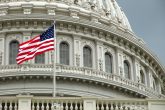March 26, 2020
The Right Way to Reform the U.S. President’s International Emergency Powers
There is growing discussion in Washington about potential reforms to presidential emergency powers, a debate that will only intensify as a result of the coronavirus pandemic. While the scale and rapidity of the crisis reminds Americans of why the U.S. government needs broad legal authorities to respond to genuine national emergencies, the potential for presidential abuse is high. Yet for most of the past year, key legislative proposals to reform presidential emergency powers have excluded one of the most important and most frequently invoked authorities: the International Emergency Economic Powers Act, or IEEPA, a broad statute that allows the president to impose a range of financial and trade restrictions, including sanctions, in response to national emergencies arising outside the United States.
IEEPA’s exclusion from reform efforts is odd. IEEPA has been used far more frequently than most presidential emergency powers–some 58 times between the 1970s and 2020. This means that IEEPA has been invoked in approximately 90 percent of the 64 instances in which a president has declared a national emergency under the National Emergencies Act, according to a study by New York University’s Brennan Center. But while IEEPA generally has been applied for entirely appropriate purposes such as imposing sanctions on Iran, terrorists, and Russia, the breadth of the statute means it is ripe for potential abuse.
Read the full article in Just Security.
More from CNAS
-
Sharper: National Security in a Divided Congress
Following the 2022 midterm elections, a new U.S. Congress was sworn in, resulting in a divided House and Senate with narrow margins. Key national security legislative items ar...
By Anna Pederson & Cameron Edinburgh
-
Western Hemisphere Migration is a Long-Term Challenge
Addressing western hemisphere migration should be a national and international priority....
By Carrie Cordero & Cris Ramón
-
The Lawfare Podcast: Klein and Cordero on the Latest FISA Numbers
To discuss the latest in FISA transparency news, the data and what it all means, Benjamin Wittes sat down on Lawfare Live with Carrie Cordero of the Center for a New American ...
By Carrie Cordero
-
Opportunity to Reform the Department of Homeland Security’s Biodefense Operations and Governance
If Russia were to engage in biological warfare against Ukraine, that act could embolden other countries to develop and use such weapons in other conflicts....
By Carrie Cordero & Asha M. George




